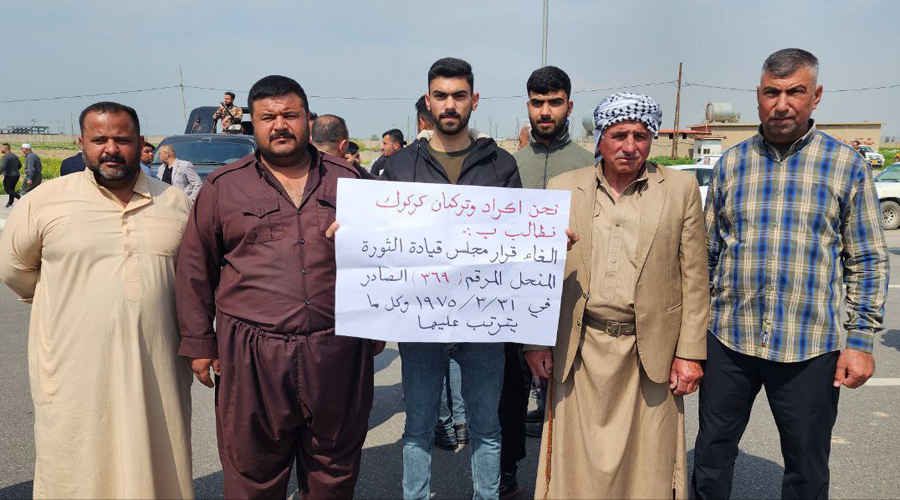Hundreds of Kurdish and Turkmen farmers gathered to protest against the efforts of the Iraqi Ministries of Municipalities and Defense to turn their lands into housing units.
Two weeks ago, a team from the Iraqi Ministry of Defense arrived at a number of villages in Kirkuk and stressed that their lands would be used to build housing units for army personnel. Last week, a delegation from the Ministry of Municipalities visited those villages for the same purpose.
In response, nearly 500 farmers from both the Kurdish and Turkmen communities participated in a protest rally organized on Friday, March 24, to demand an end to these efforts.
Sami Ghafoor, the representative of the Kurdish farmers at the demonstration, told KirkukNow, “They came and said we will build housing units and investment projects, and we will not accept this. But these two ministries now want to take our lands from us."
The villages that were requested to be evacuated are Tobzawa, Yaji, Taseen and Qazilyar, located south of Kirkuk. The protesting farmers blocked one of the main roads and showed the journalists the ownership documents (copy of deed).
Early March, the Agriculture Department of Daquq District south Kirkuk province and the farmers of a village belonging to the district oppose efforts to allocate 500 dunums of agricultural land for “military camps."
A letter issued by the State Real Estate Department in Kirkuk in early January addressed to the agricultural departments in Daquq and a number of sub-districts, requesting an inspection of at least 1000 dunums of agricultural land in Daquq, Tuz Khurmato, and the Riyadh sub-district.
According to information obtained by (KirkukNow), there are efforts to turn these lands into military camps.
The northern oil-rich city of Kirkuk, located 238 kilometers north of Baghdad, is an ethnically mixed province for 1.7 million Kurds, Sunni and Shiite Arabs, and Turkmen. It has long been at the center of disputed territories between Baghdad and Erbil.
According to the Iraqi constitution, which was approved by a majority of Iraqi voters in early 2005, the fate of the disputed territories must be decided after three stages of normalization, census and referendum, according to Article 140, up to end of 2007.
Video: Gathering by villagers protesting turning their farmlands into residential units. KirkukNow
The disputed territories is a constitutional term used to refer to the political and administrative situation in Kirkuk province and the areas that have been changed in terms of administrative and demographic conditions due to the policies of the Iraqi government from 1968 up to 2003.
Up to the present, only part of the first has been implemented, which led to tensions over administrative and security posts, disputes over ownership of lands and farms and several other issues leaving the area in poor conditions in terms of public services and security.
Hussein Mardan, the representative of the Turkmen farmers, told KirkukNow, “They want to transfer thousands of dunams of our lands into housing units. We refuse that.”
“We have copy of deed but these lands were transferred to the Ministries of Defense and Municipalities by the decision of the (dissolved) Revolutionary Command Council. Later, all were given to the Arab settlers per contracts.”
According to information KirkukNow obtained from military sources and some participants in the protest, the Ministry of Defense has stopped its efforts in this regard, but the Ministry of Municipalities is still insisting on moving forward with its plans.
Resolving disputes over the ownership of agricultural lands in Kukruk Governorate, including the lands of the villages that participated in the demonstration, depends on the implementation of Article 140.
Sabah Habib, a representative from Kirkuk province in the Iraqi parliament and one of the attendees of the gathering, told KirkukNow, “The solution is to cancel the decisions of the Baath Party.”
“These lands are within article 140 territories and it will be returned to Kurdish and Turkmen farmers by dissolving Bath party deicisons,” Habib added.





